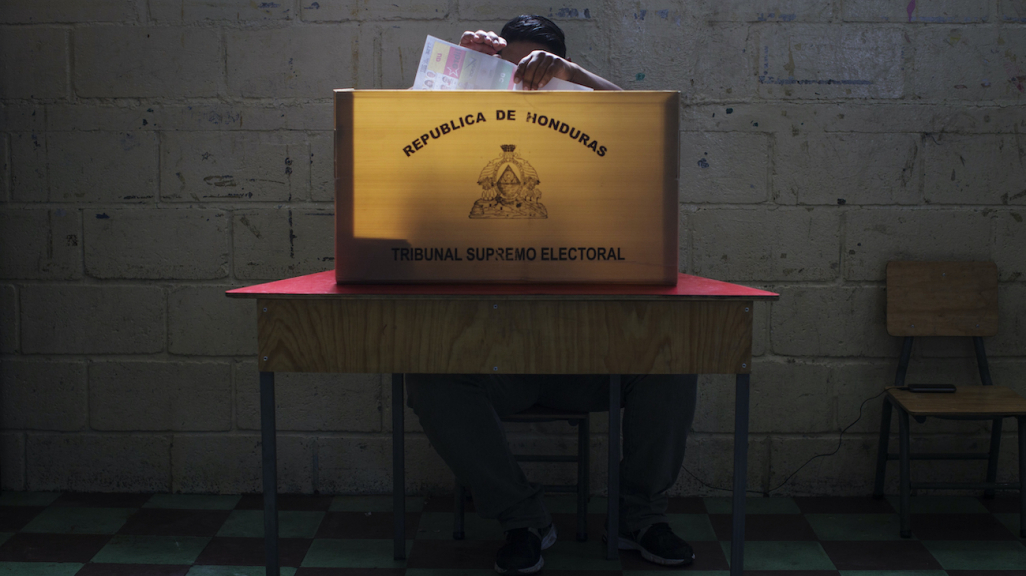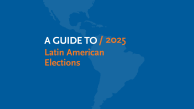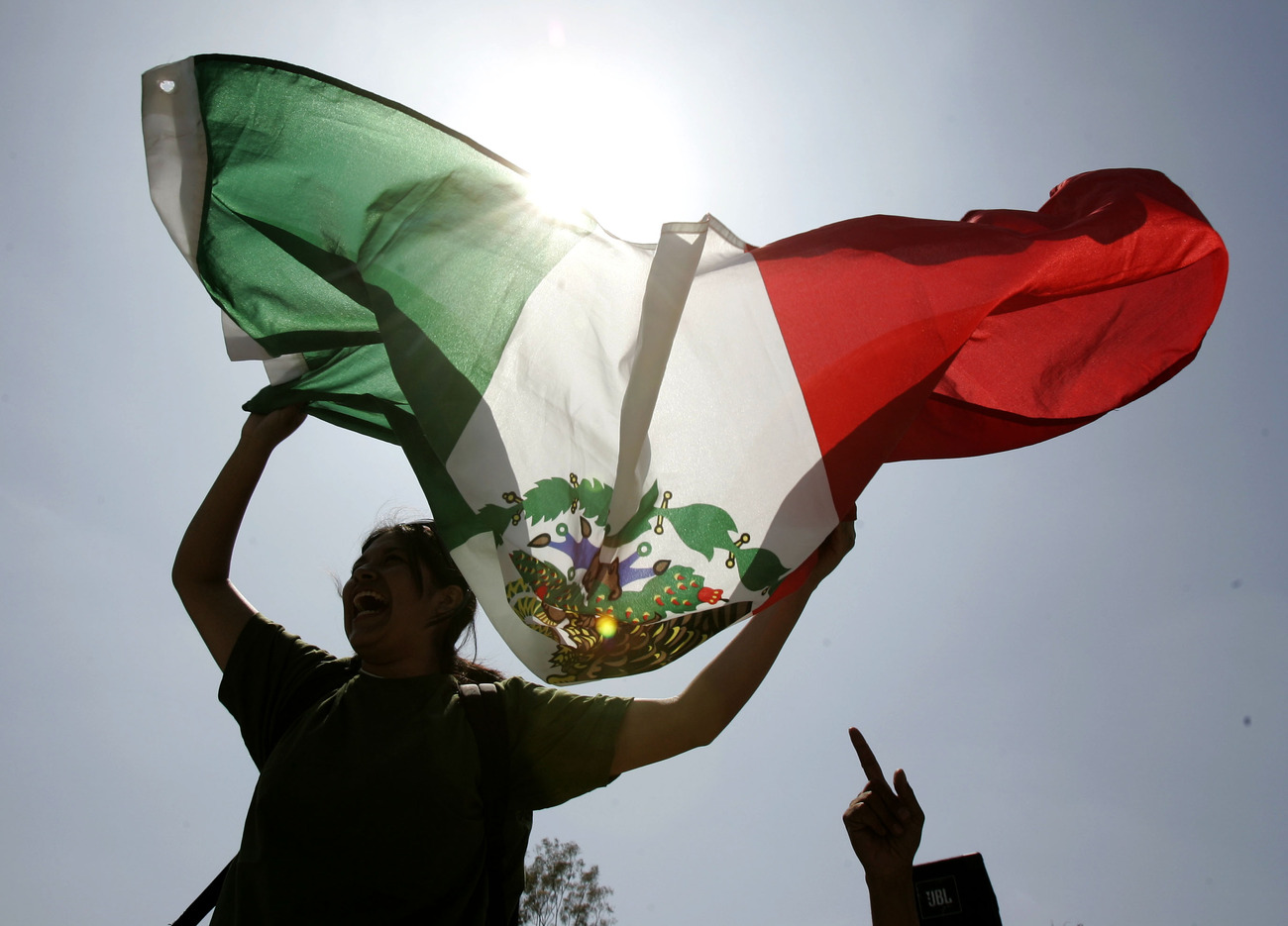Explainer: Honduras' 2025 General Elections
Explainer: Honduras' 2025 General Elections
Fears of electoral fraud and voter concerns about jobs and insecurity loom over a three-way contest for the presidency.
Election Details
Date: November 30
On the ballot: President and three presidential designates (vice presidents), all 128 members of the unicameral National Congress, 298 mayors, and over 2,000 municipal councilors.
The rules: The presidential election is a single-round vote in which the candidate with the most votes wins. Congressional seats for each administrative department are allocated through a proportional representation system, as are municipal councils.
Electorate: Over 6.5 million Hondurans are eligible to vote. Voting is mandatory, although there is no punishment for absenteeism. The electorate includes almost 400,000 Hondurans in the United States—around 6 percent of the total electorate—who can only cast ballots for president.
Turnout in last elections, held in 2021: 69 percent, the highest in at least 20 years.
Terms lengths and limits: Presidents serve four years with no possibility of reelection. The next president assumes office on January 27, 2026. A congressional term is also four years, but there are no term limits. The legislative session begins on January 25.
Voters will choose their next president November 30 in a single-round vote. Polls indicate a three-way race.
Tensions are simmering ahead of elections in Honduras, where competing accusations of electoral manipulation and fraud threaten to undermine results. Voters, who lack confidence in the integrity of the electoral process, will head to polling stations while still under an almost three-year-long state of exception as they decide which candidate they think is best suited to address pressing concerns about jobs and the state of public services.
President Xiomara Castro is constitutionally barred from reelection. Among the five options to succeed her, polling indicates there are three frontrunners, all of whom are well-known to much of the electorate. The governing Freedom and Refoundation (Libre) party has selected as its candidate Rixi Moncada, Castro’s former finance (2022–2024) and defense secretary (2024–2025). Salvador Nasralla, who resigned as Castro’s first vice president in 2024, is the Liberal Party’s candidate. Former Tegucigalpa mayor (2014–2022) Nasry “Tito” Asfura of the conservative National Party is the third contender polling in double digits.
With the exception of the relatively peaceful power transfer following the 2021 vote, recent elections in Honduras have been highly contested affairs. A June 2009 coup overshadowed elections in November that year as ousted President Manuel Zelaya—husband and advisor to current President Castro—was forced into exile. Results of the 2013 and 2017 elections were strongly questioned by Castro and Nasralla, respectively, and deepened distrust of electoral institutions. The National Party’s Juan Orlando Hernández was declared the winner of both elections despite a constitutional ban on reelection and international calls for a recount in 2017. In 2024, a U.S. court sentenced Hernández to 45 years in prison on drug trafficking offenses that occurred both during and before his presidential term.
This year, domestic and international observers warn there are troubling signs that another volatile election dispute could be in store.
On October 29, Public Prosecutor Johel Zelaya (of no apparent relation to the former president) launched an investigation into an alleged plot to manipulate vote counts involving a member of the National Electoral Council (CNE), a National Party legislator, and a military officer. Castro, whose LIBRE party helped propel Zelaya to the head of the supposedly independent Public Ministry, then claimed the opposition was conspiring to enact an “electoral coup.” This accusation was echoed by Libre candidate Moncada. But those accused claim the audio of the conversation on which the allegations are based was artificially generated.
Opposition politicians and civil society groups then sounded the alarm of possible military interference after the head of the Joint Staff of the Armed Forces asked the CNE for access to the voting records. Though the armed forces are responsible for securing and transporting election materials, the Constitution does not lay out a role for them in the vote count. The CNE has not yet responded to the request, but Liberal candidate Nasralla released a social media video accusing the military head of working with the Castro government to rig the election. This followed March 9 primaries marred by the delayed arrival of election materials to several polling stations, which the opposition blamed on the armed forces and, by extension, the government, pointing specifically to then-Defense Minister Moncada.
As candidates and their parties exchange accusations, international observers including the Organization of American States, Transparency International, a group of former right-wing leaders of Latin America and Spain, and U.S. Deputy Secretary of State Christopher Landau have all issued statements calling for transparent elections and warning of threats to the credibility of the vote.
On November 20, U.S. Rep. Maria Elvira Salazar (R-FL), chairwoman of the Western Hemisphere Subcommittee of the House Foreign Affairs Committee, convened a congressional hearing entitled “Democracy in Peril: the Fight for Free Elections in Honduras” in which she asked Hondurans “not to elect a communist” and appealed for “no intimidation, no stolen ballots, no foreign interference.” The following day, it was announced that seven Republican and two Democratic congresspeople will travel to Honduras to observe the elections.
Income and employment
Recent polling shows that employment concerns are top of mind for voters. While the unemployment rate has fallen from 8.6 in 2021 to 5.2 percent in 2024, almost 75 percent of active labor force worked informally in 2024, down from a peak of 83 percent in 2017, according to government statistics.
At 63 percent, the proportion of Hondurans surviving below the poverty line has stagnated over the past decade and is one of the highest in the region, per 2024 World Bank figures.
These issues, together with the impact of recurring storms and severe flooding as well as gang violence, have produced large-scale displacement in recent decades both within the country and northward to Mexico and the United States. Still, despite fears that the ramped-up immigration crackdown in the United States would drive down remittances, Central Bank statistics show that migrant transfers have actually increased in 2025 and are on track to surpass $10 billion. Remittances represent over 25 percent of Honduras’ GDP.
Security
Hondurans have been living under a state of exception since December 2022. The administration of Castro, who was once a strong proponent of demilitarization, instituted the measure in response to a surge of extortion and has deemed it necessary to curb related violence. Research from InSight Crime notes that between 2022 and 2024, murder rates halved in the capital of Tegucigalpa and the industrial hub of San Pedro Sula. But the national homicide rate has been shrinking for years, from 86.5 murders per 100,000 inhabitants in 2011 to 26 in 2024. However, an ACLED report suggests forced disappearances may be on the rise as organized crime drifts to rural areas.
On November 12, less than three weeks away from the election, the government announced the twenty-sixth 45-day extension of the state of exception. Many extensions have been proclaimed without congressional approval.
AS/COA covers 2025's elections in the Americas, from presidential to municipal votes.
Rixi Moncada, Libre
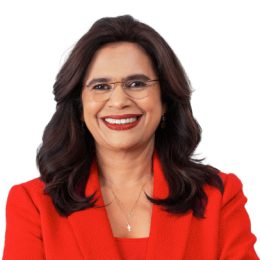
A trained lawyer and university professor, Moncada’s political trajectory developed within the inner circle of Presidents Zelaya and Castro, alongside whom she co-founded Libre. She has held various public sector roles, including serving as labor secretary (2006–2008) and manager of the National Electric Energy Company (2008–2009) in the Zelaya administration. She became the first woman to lead Honduras’ defense secretariat under Castro.
“I represent a popular, leftist, democratic socialist, humanist project that invokes the fundamental principles of Christianity,” declared Moncada, 60, during a televised townhall-style event on October 23. The Libre candidate has pitched herself as the continuation of Castro’s agenda. Under the slogan “saving the public sector,” her campaign centers on a rejection of privatization and a defense of state-led wealth redistribution.
Her plan to “democratize the economy” emphasizes expanding access to credit for small businesses and young entrepreneurs, cracking down on corporate corruption, and supporting legislation to raise taxes on big business. She has also proposed establishing “productive development poles” that boost specific sectors by region to attract private investment and create employment. The social pillar of her platform includes promoting free basic education and scholarships for university students, rent freezes, and free public transport.
Moncada’s infrastructure agenda promises to make progress on a megaproject to connect the country’s Caribbean and Pacific coasts by railway. The project has recently gained traction in the Castro administration’s agenda.
Moncada plans to increase military and police presence in “vulnerable zones,” maintaining the militarization of law enforcement.
She is expected to continue the incumbent government's foreign policy alignment with other left-wing administrations. In 2023, Honduras switched its recognition of Taiwan to the People’s Republic of China and joined the Belt and Road Initiative. Relations with the United States have been both conflictive and cooperative. On one hand, Honduras has accepted regular deportation flights, both for its own returned citizens and as a layover for Venezuelan repatriates. On the other hand, in August 2024, Castro suspended the countries’ bilateral extradition treaty in the aftermath of the U.S. ambassador to Honduras’ criticism of a meeting between Honduran and Venezuelan officials. The administration later reinstated the treaty and said it would be up to the incoming government to decide its fate.
Salvador Nasralla, Liberal Party
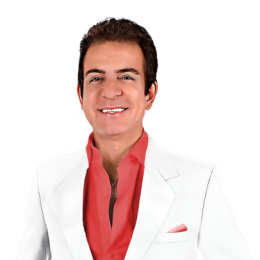
A television presenter educated as a civil engineer, Nasralla, 72, is making his fourth try for the presidency. The Liberal Party candidate’s colorful campaign history involves twice setting up new parties to support his presidential ambitions—in the 2013 and 2021 elections—and entering an alliance for the 2017 vote with LIBRE leader Xiomara Castro as his running mate. In fact, Nasralla abandoned his 2021 campaign to return the favor and join Castro’s successful ticket as her first vice president. However, he resigned from the role in April 2024 to once again run for office, saying he felt marginalized in the administration.
The reduction, simplification, and digitalization of state bureaucracy to boost economic activity is the thrust of Nasralla’s platform. Highlighting the country’s relatively high labor and energy costs compared to its Central American neighbors he has proposed offering fiscal incentives to export-oriented businesses. With the aim of increasing the tax base, he is eyeing a reform of the labor code to gradually incorporate hourly paid workers into the formal sector. He also intends to restructure the national electricity company and invite international tenders for electricity distribution.
The Liberal candidate has laid out an ambitious plan to construct a “dry canal,” a series of roadworks connecting key ports on the Pacific and Atlantic Oceans. This would build on a similar project completed during the Hernández government.
On the security front, Nasralla often references President Nayib Bukele’s approach in El Salvador as a model to tackle crime.
In October, Nasralla said Honduras could “maintain trade relations with Venezuela and continental China, but our focus will be on the Western world.” About a month later, during a television interview, Nasralla said that he would not have “relations of any kind with a country like Venezuela” where there is “an illegitimate regime or a leader under question.” He has identified the United States, Israel, the European Union, Japan, South Korea, and Taiwan as international partners with whom to develop close political and commercial ties, as well as opportunities for education, training, and technological cooperation.
Nasry "Tito" Asfura, National Party
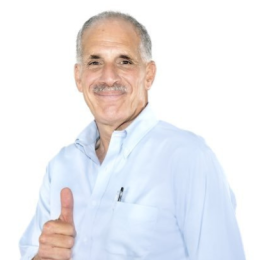
This is the second consecutive presidential campaign for construction magnate Nasry “Tito” Asfura, 72, who also goes by “Papi a la Orden.” The conservative National Party candidate’s political career has been rooted in Tegucigalpa, which he represented in Congress from 2010 to 2014 before serving as a two-term mayor from 2014 to 2022.
“Administrator. Executor. Facilitator.” That’s how Asfura defines his role in the relationships he’s aiming to build with investors if elected president. His economic platform is based on the premise that political and legal stability will create a business-friendly climate that will, in turn, boost employment and generate the level of income needed to cover basic needs. His governance plan outlines ambitions to revive factories and establish free trade zones and industrial parks to foster nearshoring opportunities.
Like his opponents, Asfura has emphasized the need to improve and expand the country’s transport and energy infrastructure. His agenda proposes granting greater autonomy to the state electricity company while encouraging private-sector participation in the energy sector, diversifying the energy matrix with renewable sources, and combating waste through the installation of smart meters. In addition to extending and improving road and port infrastructure, a ten-year plan to build 550,000 social housing units features in his agenda.
In a nod to concerns regarding the state of exception, Asfura’s platform pledges to audit the police and mandate anti-corruption and human rights training. He also proposes upping the presence of interagency forces in “critical areas” and creating special units to identify and dismantle extortion rings.
“Our international agenda is founded in the triangle of the United States, Israel, and Taiwan,” affirmed Asfura, the son of Palestinian immigrants, in a newspaper interview. He travelled to Washington in July to meet with public and private sector authorities to prepare support for his infrastructure plans.







